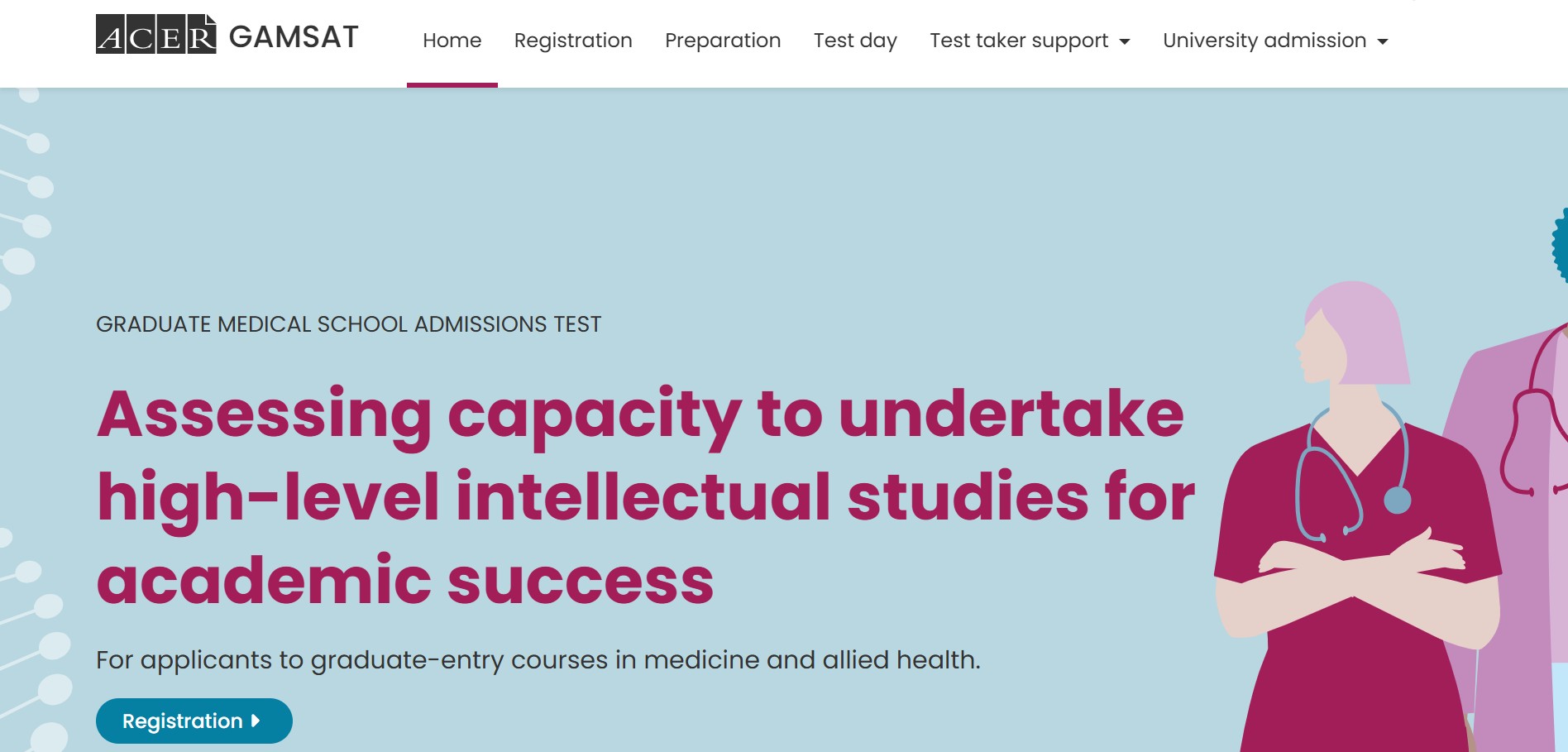What is the purpose of the GAMSAT Exam?
The main purpose of the GAMSAT ® is to assess medical school candidates' suitability to study medicine and eventually become a doctor. ACER (Australian Council for Educational Research) is the official organiser of this exam, and the main thing they will be looking at is the candidate's reasoning and problem solving skill, since it's a good indicator of how well the candidate will adapt to the challenges of undertaking a graduate-level medical program. ACER assesses med school candidates' reasoning and problem solving skills through the three sections of the GAMSAT ® exam:
-
The Reasoning in Humanities and Social Sciences Section - aims to evaluate a student's ability to sift through information, understand the information given, identify key points, make justifiable deductions, and to select the 'best answer'.
-
The Written Communication Section - is designed to test the student's ability to synthesise ideas in response to a set of prompts, and to communicate these ideas to an unknown audience under strict time pressure.
-
The Reasoning in Biological and Physical Sciences Section - aims to test the ability to apply learned knowledge of physiological systems to new information or data, or to understand new information presented and to use it to answer questions.
GAMSAT Exam Information
To further answer the question "What is GAMSAT ®?", in essence, the exam is designed to assess your analytical and critical thinking skills, as well as how you organise and communicate your ideas, in order to select candidates for
Graduate Entry Medical Studies in Australia.
The GAMSAT ® tests skills that will be needed both as a medical student and as a healthcare professional.

In hospitals, interactions with patients begin by trying to understand the medical and social history of a patient. You must be focused and consider all details of a patient's story in order to determine their physical and mental state, and thus provide accurate medical care. The best medical students and professionals are able to provide holistic care in response to a person's unique situation. Imagine a person fractures their femur and comes to a hospital for care. There's no point sending them home with a repaired femur if they live alone in an upstairs bedroom with no railing. These are the critical thinking skills that ACER GAMSAT ® aims to assess.
GAMSAT ® Reasoning in Humanities and Social Sciences
aims to evaluate a student's ability to sift through information, identify key points, and make justifiable deductions as is critical in the life of a medical professional.
Communication is another essential skill in all medical professions. You need to be able to convey information clearly and empathetically to patients and their families, as well as communicating concisely and accurately with other medical professionals. More broadly, scientific communication is an essential ingredient in the trust communities will place in healthcare personnel.
GAMSAT ® Written Communication
is designed to test your ability to communicate ideas to an unknown audience under strict time pressure, which is a critical skill for healthcare professionals.
Medical decisions and strategies are almost always based on assessments of data, scientific information and systems. The ability to interpret patterns and anomalies, and use this to make decisions regarding a person's health, is key in life as a medical professional. This information can come in almost limitless forms, whether that be imaging, blood tests, ECGs, histories or examinations. A good medical professional and medical students will have the ability to apply their learned knowledge of physiological systems to new information or data. These are the skills that are tested in
GAMSAT ® Reasoning in Biological and Physical Sciences.
Do I need to complete the GAMSAT Exam to study medicine?
To study medicine in Australia as a graduate, you will most likely have to complete the GAMSAT ® exam. There are currently 14 Medical Schools that provide a four-year Graduate Entry Medical Program, 12 of which require the GAMSAT ® exam - for a full list,
see further down this guide here.

The exceptions to the pattern are the Graduate Entry Medical Programs offered at Monash University and at Bond University. The GAMSAT ® Exam was removed as an admissions criteria for Monash University in 2017, and is no longer required. Note, however, that domestic applicants for the Graduate Entry Medical Program at Monash University must have completed one of the approved bachelor degrees at Monash University - that is to say that external domestic applicants are no longer accepted.
For more details on the Monash University Medical School, you can visit
their website.
Bond University is a private university and has a totally separate entry process to GEMSAS. Intake for the academic year, and therefore the application deadlines, also occur at different times to the other universities. More information can be found on
their website.
It's also important to note that there are undergraduate
pathways to medicine.
If you plan to take this path, you'll need to take the
UCAT ® exam.
What is a Good Score for GAMSAT?
When it comes to deciding what makes a "good" GAMSAT ® score, it's important to look beyond the raw score and consider how you rank against other candidates. That means, you should pay more attention to the percentile rather than the raw score. It's a safe bet to aim to be slightly above average — that means, aiming to outperform the 50th percentile. For the March 2025 GAMSAT ® Exam, this was around a score of 59. To be more competitive, you should aim for at least the top 25% of applicants, which equates to roughly a score of 64. For more detailed information about this, check out our
GAMSAT scores page.
Is GAMSAT Exam Harder Than UCAT?
The general consensus is that the
GAMSAT ACER
exam is harder than the
UCAT ®
. This is due to the following reasons:
-
The GAMSAT ® exam is longer than the UCAT ®
-
The UCAT ® has no assumed knowledge, it is rather concerned with transferable skills as it is targeted to upper secondary school students. However, the GAMSAT ® exam requires specialist knowledge of Year 12 and first year university level physics, chemistry and biology
-
There are no essays in the UCAT ®
-
The UCAT ® is a more structured exam and is therefore easier to prepare for, whereas the GAMSAT ® covers expansive curriculum areas
For more information about the difference between GAMSAT ® and UCAT ®, check out our guide on
UCAT ® vs GAMSAT ®
How do I apply for the GAMSAT Exam?
The GAMSAT ® exam is offered twice a year, once in March and once in September. To find the most up-to-date information on registration dates and requirements, you should
visit the official ACER website.
There are also different fees associated with completing the GAMSAT ® exam, so it is important to make sure you are aware of the registration dates and late windows. Visit our guide to
GAMSAT ® 2026
to learn more about this.
In order to sit the GAMSAT ® exam students must
create an online account
and provide a valid email address. This account will be used for all communication with ACER, including test times, accessing the actual exam and finding your results.
How do I know if I am eligible for the GAMSAT exam?
GAMSAT ® eligibility is determined mainly by your progress through a Bachelor or undergraduate degree, and your intentions to study a course where the GAMSAT ® is a prerequisite. You are eligible to sit the GAMSAT ® exam if you have completed a Bachelor or undergraduate honours degree, or are currently enrolled in one, at the point of taking the GAMSAT ® exam. The best place to find the most up-to-date information on eligibility for the GAMSAT ® exam is on the official ACER website,
which you can find here.

In almost all cases, you are still eligible to take the GAMSAT ® exam and be accepted into a medical school if you have studied an undergraduate degree in a non-scientific field. Many of our students are from non-science backgrounds, and many have successfully entered medical schools.
GAMSAT ® preparation from a non-science background
may be challenging, but it's not impossible. In fact, students from a non-science background may find the first two sections of the exam significantly easier than students with a science background. Very few prerequisite requirements exist for Australian graduate-entry medical schools, with only the University of Queensland requiring the completion of certain subjects (or their equivalents). For further information,
refer to the UQ website here.
Of course, these requirements can change and you should consult the official course requirements of the specific university to find out what subjects or degrees are required. It is also worth noting that while a scientific background is not essential for eligibility in the GAMSAT ® exam, it is necessary to have a relatively well-founded biological and physical knowledge-set in order to perform well in the exam.
There is a special case for students at the University of Exeter Medical School and Plymouth University Peninsula Schools of Medicine & Dentistry in the UK if you believe you have sufficient intellectual maturity and subject knowledge to meet the demands of the test.
What GPA Do You Need to Sit the GAMSAT Exam?
There is no hard and fast rule concerning your GPA, however,
it would be extremely beneficial to have a GPA of 6.0 and above.
This is because you may not necessarily have to score as high in the GAMSAT ® exam when you have a higher GPA as most universities consider your GAMSAT ® score, GPA, and
medical school interview
score when deciding whether to offer a place.
Visit our blog article to learn more about what options you have for
studying medicine with a low GPA.
How Long is the GAMSAT Exam Valid For?
As of a change
announced by ACER
in November 2022, your GAMSAT ® results are now valid for four years in Australia. Previously, results were only valid for two years. For example, if you sat the exam during March 2025, the result will be valid for your:
-
2025 application for a program commencing in 2026;
-
2026 application for a program commencing in 2027;
-
2027 application for a program commencing in 2028;
-
2028 application for a program commencing in 2029.
In addition, this change is backdated, so GAMSAT ® exam results from September 2022 can be used for medical schools application in 2026 with a 2027 start.
Note that the below information is specific to
Australian medical schools
and the details may differ, particularly for students based in the UK - Students in the UK should check the details on
ACER's website here.
Currency of GAMSAT ® Results
| Application Details |
Valid Results |
| Apply 2026 for 2027 Commencement |
March GAMSAT ®: 2023, 2024, 2025, 2026
September GAMSAT ®: 2022, 2023, 2024, 2025
|
| Apply 2027 for 2028 Commencement |
March GAMSAT ®: 2024, 2025, 2026, 2027
September GAMSAT ®: 2023, 2024, 2025, 2026
|
| Apply 2028 for 2029 Commencement |
March GAMSAT ®: 2025, 2026, 2027, 2028
September GAMSAT ®: 2024, 2025, 2026, 2027
|
Results from a September Sitting cannot be used for an application in that same year for commencement in the subsequent year. For example, if you sit the September 2026 GAMSAT ® Exam, you will be able to use the results of this exam for application in 2027 for a program commencing in 2028, for application in 2028 for a program starting in 2029, for application in 2029 for a program starting in 2030, and for application in 2030 for a program starting in 2031. You won't be able to use this result for an application in 2026 for 2027 entry. This is because medical school applications, which require submission of GAMSAT ® scores, start around May with offers for interviews being made from August to September.
In November 2022, ACER announced that your GAMSAT ® results are now valid for four years. Previously, results were only valid for two years. This change is backdated, so GAMSAT ® exam results from September 2022 can be used for medical schools application in 2026 with a 2027 start.
Note that the above information is specific to Australian universities and the details may differ, particularly for students based in the UK. To learn more about sitting the GAMSAT ® Exam this year,
read the ACER Admissions Guide.
To learn more about how GAMSAT ® Scores are actually calculated, visit our guide:
Understanding your GAMSAT ® Scores.
To learn more about applying for Graduate Entry Medical Schools in Australia and the different admissions criteria and weightings, visit our guide:
Australian Medical Schools - Entry Requirements.
GAMSAT Exam Structure
Since 2020, the exam has been administered in a digital format.
In addition, in November 2022, ACER announced that GAMSAT ® Exam results are now valid for 4 years instead of the usual 2. You can learn more about how this major change affects your GAMSAT ® Preparation and medical school application through our comprehensive guide to
GAMSAT ® 2026.
Since 2024, the GAMSAT ® exam has been split into two distinct test windows. The initial window focuses on the GAMSAT ® Written Communication Section, which will be administered through remote proctoring for all participants. The next test window, usually about 3 weeks after the initial one, encompasses the GAMSAT ® Reasoning in Humanities and Social Sciences, as well as Reasoning in Biological and Physical Sciences. These sections will be undertaken at physical test centers.
Current GAMSAT Exam Structure
Remote Proctored Component
|
Description |
Breakdown |
Duration |
|
GAMSAT Written Communication
|
Tests your general knowledge and ability to draw on prior knowledge under pressure to construct a cohesive argument or reflection
|
2 Questions |
65 Minutes |
Test Centre Component
|
Description |
Breakdown |
Duration |
|
Registration
|
Pre-testing procedures should be faster as there will be fewer candidates per testing venue than in previous years. However, it is not possible to guarantee start and finish times just in case unforeseen delays occur.
|
- |
~1 hour |
|
GAMSAT Reasoning in Humanities and Social Sciences
|
Tests critical reasoning skills as well as the ability to draw conclusions based on evidence with stimuli derived from a variety of non-scientific texts.
|
62 MCQs |
100 Minutes |
| Break |
Take a well deserved break! Consider bringing your own food as the break only lasts 30 minutes and there will not be access to kitchens or food outlets in the venue.
|
- |
30 Minutes |
|
GAMSAT Reasoning in Biological and Physical Sciences
|
40% Biology, 40% Chemistry, 20% Physics
|
75 MCQs |
150 Minutes |
ACER has now also released their
2026 GAMSAT ® Information Booklet
with details on the format of the exam.
Although the total test time is itself around 4 hours and 10 minutes for the Test Centre Component,
ACER
recommends that you be prepared to spend at least 5.5 hours at the test centre due to registration and procedural time. As such, it can be argued that the GAMSAT ® Exam is as much a test of perseverance and stamina as it is a test of your analysis and critical thinking skills.
GAMSAT is offered twice a year, in March and September. GAMSAT which was previously delivered as paper based test will be delivered as a digital test
from 2020 onwards.

ACER
(Information Booklet)
ACER will randomly allocate candidates to testing venues and sessions in their selected test centre location. This is subject to candidate demand and the availability of testing venues at that location. ACER advises to register early as places may be limited.
The structure of the GAMSAT ®
Exam has undergone several revisions. For the current format, there is a 30 minute break between the Humanities and Science sections.
When sitting the GAMSAT ® Exam, students are allowed two (2) sheets for the Written Communication Section, and four (4) sheets for the Humanities and Biological Sciences test Sections (2 sheets per section).
In regards to other equipment allowed during the exam, this is comprehensively covered in the
ACER Information Booklet.
Also outlined in the information booklet is that students should make sure that they have the correct identification documents prepared before exam day, as well as their Admission Ticket.
For more information on the exam day itself and how to register for the GAMSAT ® Exam, visit our guide to taking the GAMSAT ® Exam in 2026:
GAMSAT ® 2026 - What you need to know
Download our GAMSAT ® Study Syllabus for a full list of science topics as well as tips and advice for humanities:
Your overall score is in general determined as follows:
Overall Score = (1 × Humanities & Social Sciences + 1 × Written Communication + 2 × Biological & Physical Sciences) / 4
*This formula means that your Overall GAMSAT ® score is 50% Science and 50% Non-science.
Note however that there are some exceptions to this formula - to learn more about how GAMSAT ® scoring works and view different university score cutoffs, visit our
GAMSAT ® Results Guide
Previous GAMSAT Exam Structure
Paper GAMSAT Exam Structure
|
Section 1 |
Section 2 |
Section 3 |
| Number of questions |
75 |
2 |
110 |
| Reading Time |
10 minutes |
5 minutes |
10 minutes |
| Writing Time |
100 minutes |
60 minutes |
170 minutes |
A quick glance of the numbers above should reveal that the paper GAMSAT ® Exam was a real marathon, with around 6 hours of testing time - Students could in fact expect to remain at the venue for roughly 8-9 hours including administrative time and the 1 hour lunch break.
That is not to say that the new digital format is any less gruelling - Indeed there are additional challenges posed by the digital test, including an inability to directly annotate questions as well as the added element of eye strain from viewing a device screen for such an extended period of time.
May 2020 Online GAMSAT Exam Structure
|
Section 1 |
Section 2 |
Section 3 |
| Number of questions |
40 |
2 |
60 |
| Test Time (Reading & Writing time combined) |
60 minutes |
65 minutes |
120 minutes |
Interestingly, this particular sitting was delivered remotely with online proctoring. In addition, Section 1 & 2 was conducted in a different session from Section 3. Students could sit Section 1 & 2 on a particular day and Section 3 roughly a week later. There was no separate reading time for this sitting - Reading time was incorporated into the writing time.
It now appears that the format of the May 2020 Online GAMSAT ® Exam will remain a one-off occurrence, reflective of the unique and challenging circumstances at the beginning of 2020 and COVID-19.
2021 GAMSAT Exam Structure
|
Section 1 |
Section 2 |
Section 3 |
| Number of questions |
47 |
2 |
75 |
| Reading Time |
6 minutes |
5 minutes |
8 minutes |
| Writing Time |
64 minutes |
60 minutes |
142 minutes |
From September 2020 onwards, the GAMSAT exam moved to a computer based test delivered in supervised test centres, rather than remotely. The above exam structure ran from September 2020 - September 2021, and included a 30 mins lunch break rather than a 1 hour lunch break. Due to the shortened duration, ACER ran two sittings a day, with a morning sitting at around 7 AM and an afternoon sitting at 2PM.
GAMSAT Exam - Theory vs Problem Based Learning
In answering the question "What is GAMSAT ®," it is important to remember that the GAMSAT ® exam is focused on examining your reasoning and problem solving skills rather than your recall of specific content. This applies in particular to
Reasoning in Biological and Physical Sciences
.
Although the assumed knowledge is equivalent to first year university levels of biology and chemistry along with a Year 12 level of physics, you will largely be faced with advanced-level, novel content designed to assess your reasoning skills. In fact, over the past two years we've seen a shift in the GAMSAT exam away from content-based MCQs towards MCQs designed to test your reasoning skills with a greater emphasis on graphs, diagrams and mathematical relationships.
In this sense, the GAMSAT ® Exam is entirely different to a typical university assessment and as such, your
GAMSAT preparation also needs to adapt accordingly.
.
Since problem-based learning techniques are central to modern medical curricula, GAMSAT ® is constructed with a major focus on the assessment of problem solving ability across a wide range of subject areas.

ACER
(Structure and Content)
A common error is for students to prepare for the GAMSAT ® Exam as though it were a knowledge-based one. Although understanding the foundational content is absolutely key to your success, the greater focus must lie in learning to apply that knowledge, using it in a problem-solving setting, and ultimately developing your reasoning skills to equip you to properly handle novel content - i.e. Problem Based Learning (you can learn more
here
).
ACER states:
The purpose of GAMSAT ® exam is to assess the ability to understand and analyse written and graphically presented material. GAMSAT ® measures … the ability to reason, make logical deductions and form judgments…. some specific preparation covering relevant basic sciences to first year university level is highly recommended.

ACER
(Prepare)
It must be stressed that success in GAMSAT ® is unlikely without knowledge and ability in the biological and physical sciences.

ACER
(Eligibility)
That's why our GradReady
GAMSAT ® Preparation Courses
focus on first building the foundational content before honing in on how to best apply that knowledge in the reasoning and problem solving environment of the GAMSAT ® Exam. We focus on problem-based learning, all whilst letting you familiarise yourself with the question formats and helping you build up MCQ strategies.
Sign up for our GAMSAT Free Trial today, which includes 20 MCQs from our Intelligent MCQ Bank, a full-length practice test, access to our week-by-week study guide for each section, and a wealth of other GAMSAT resources:
Start Your GAMSAT ®
Preparation Today!
Which Universities require the GAMSAT Exam?
There are currently 14 medical schools that provide a four-year Graduate Entry Medical Program, 12 of which require the GAMSAT ® exam.
Of these 12, 10 are members of the GAMSAT ® Consortium and their medical courses are participants in
GEMSAS (Graduate Entry Medical Schools Admissions System)
.
GEMSAS acts as a single hub for applications to the 10 medical schools that make up its members. It manages applications, calculates grade point averages (GPAs) and applies individual school selection rules to allocate and organise interview and course offers to candidates around Australia. For more details, you can visit
their website
and
review the most up to date Admissions Guide.
Two medical schools - the University of Sydney and Flinders University - are not part of GEMSAS, but still require the GAMSAT ® exam as well as separate, direct applications. One medical school, the University of Tasmania, offers a five-year degree, with multiple application pathways, one of which requires the GAMSAT ® exam as well as a separate, direct application.
Medical Schools that require the GAMSAT ® exam include:
In addition, the GAMSAT ® exam is required for the following courses:
University of Queensland:
University of Western Australia:

Monash University is the final Medical School to provide a Graduate Entry Medical Program. However, the GAMSAT ® Exam was removed as an admissions criteria in 2017, and is no longer required. Note however that domestic applicants for the Graduate Entry Medical Program at Monash University must have completed one of the approved bachelor degrees at Monash University - that is to say that external domestic applicants are no longer accepted.
For more details on the Monash University Medical School, you can visit
their website.
Bond University is a private university and has a totally separate entry process to GEMSAS. Intake for the academic year, and therefore the application deadlines, also occur at different times to the other universities. More information can be found on
their website
To learn more about the different Graduate Entry Medical Schools in Australia and their different admission requirements, visit our guide:
Australian Medical Schools: Entry Requirements
.
GAMSAT Preparation Materials
Now that you've got some background on the GAMSAT ® Exam, visit some of our other free resources to learn more:
-
Everything you need to know about the GAMSAT ® Exams in 2026 from registration dates to locations.
-
A breakdown of how to approach study effectively and how to set up a GAMSAT ® study schedule
-
Covers everything you need to know about your GAMSAT ® Results - How the scoring works, result release dates and even GAMSAT ® score cutoffs.
-
A breakdown of how to approach GAMSAT ® study effectively if you come from a non-science background.
Start Your GAMSAT ®
Preparation Today!
In addition, you can read this ten-year retrospective overview of the GAMSAT ® Exam, published in 2015, which includes a breakdown of candidates' performance:
GAMSAT ® Exam - Retrospective Review
GradReady GAMSAT ® Preparation Courses
|
Course
|
Key Features
|
Description
|
|
GradReady GAMSAT ® Online Courses
|
|
Online (Essentials)
|
7000+ Intelligent MCQ Bank
1200+ page Textbook
8 Online Practice Exams
2 Marked Essays with Personal Feedback
5 Mock Exams
|
Designed for students who are unable to make our attendance classes, this course gives you the essentials to succeed.
|
|
Online (Comprehensive)
|
8 Marked Essays with Personal Feedback
15 Online Practice Exams
GetClarity: Tutor Assistance when you need it on whatever you need it on
|
All the features of our Online (Essentials) Course plus more Marked Essays, Practice Exams, and on-demand Tutor Assistance with our GetClarity system
|
|
GradReady GAMSAT ® Attendance Courses
|
|
Attendance (Comprehensive)
|
15 Day Course - 75+ hours of Learning
10 Marked Essays with Personal Feedback
GetClarity: Tutor Assistance when you need it on whatever you need it on
5 Mock Exams and Subsequent Review
Complimentary Additional Round of Virtual PBLs
|
Our most popular course. Includes all the live classes as well as access to our Online (Comprehensive) resources
|
|
Attendance (Complete Care)
|
15 Day Course - 75+ hours of Learning
12 x 1 hour Private Tutoring sessions
5 Mock Exams and Subsequent Review
Complimentary Additional Round of Virtual PBLs
|
Everything you need to succeed – includes private tutoring sessions in addition to the Attendance (Comprehensive) Package
|
|
Attendance (Success Assured)
|
15 Day Course - 75+ hours of Learning
36 x 1 hour Private Tutoring sessions
Personal GradReady Success Leader
5 Mock Exams and Subsequent Review
2 Complimentary Re-Enrolments (each valid for 1 year)
Complimentary InterviewReady Course Enrolment
|
Our most comprehensive course - valid for up to 3 years. You will be assigned a personal tutor (GradReady Success Leader) who will be supporting you throughout your journey
|
To learn more about our GAMSAT ® Preparation courses and compare their different components, view an in depth comparison here:
GradReady Course Comparison
If you’re after a single feature, such as our Textbook, or access to our 7000+ Intelligent MCQ Bank, or if you want to customise your preparation, you can do so here:
GradReady GAMSAT ® Custom Course.
At GradReady, we pride ourselves on providing students with the
Best Results
at the
Best Value:
-
Our team is consistently reinvesting in our internal operational technology to ensure that we're constantly improving our efficiency and productivity. The end result for our students is that we stand head and shoulders above our competition in the comprehensiveness of the tools we offer and the effectiveness of our teachings –
all at the best value
.
-
We believe in a data-driven approach: using student performance data to fine tune our practice questions, study content and teaching styles has allowed us to achieve
unparalleled results
for our students.
-
We are the only provider with Statistically Significant Proven Results – our students achieved an average improvement of
20+ Percentile Points, 12+ years in a row,
with an average improvement of 25 Percentile Points for the May 2020 GAMSAT ® exam.
-
We achieve these results through our interactive teaching style and adaptive online learning technologies. Our classes are capped at 21 students, and taught by a specialist tutor for each subject, tutors who are themselves Medical Students who have sat the GAMSAT ®.
- Our online systems make learning into a science and we are the only provider with a proprietary online system that uses algorithmic-assisted, targeted learning. Unlike other providers who purchase a 3rd Party System, the targeted system that we've developed tracks your performance, quickly identifying your weaknesses and pointing you to the most relevant materials and even tutor assistance.
To learn more about our courses and compare us to the competition, visit:
GradReady GAMSAT ® Preparation Courses









